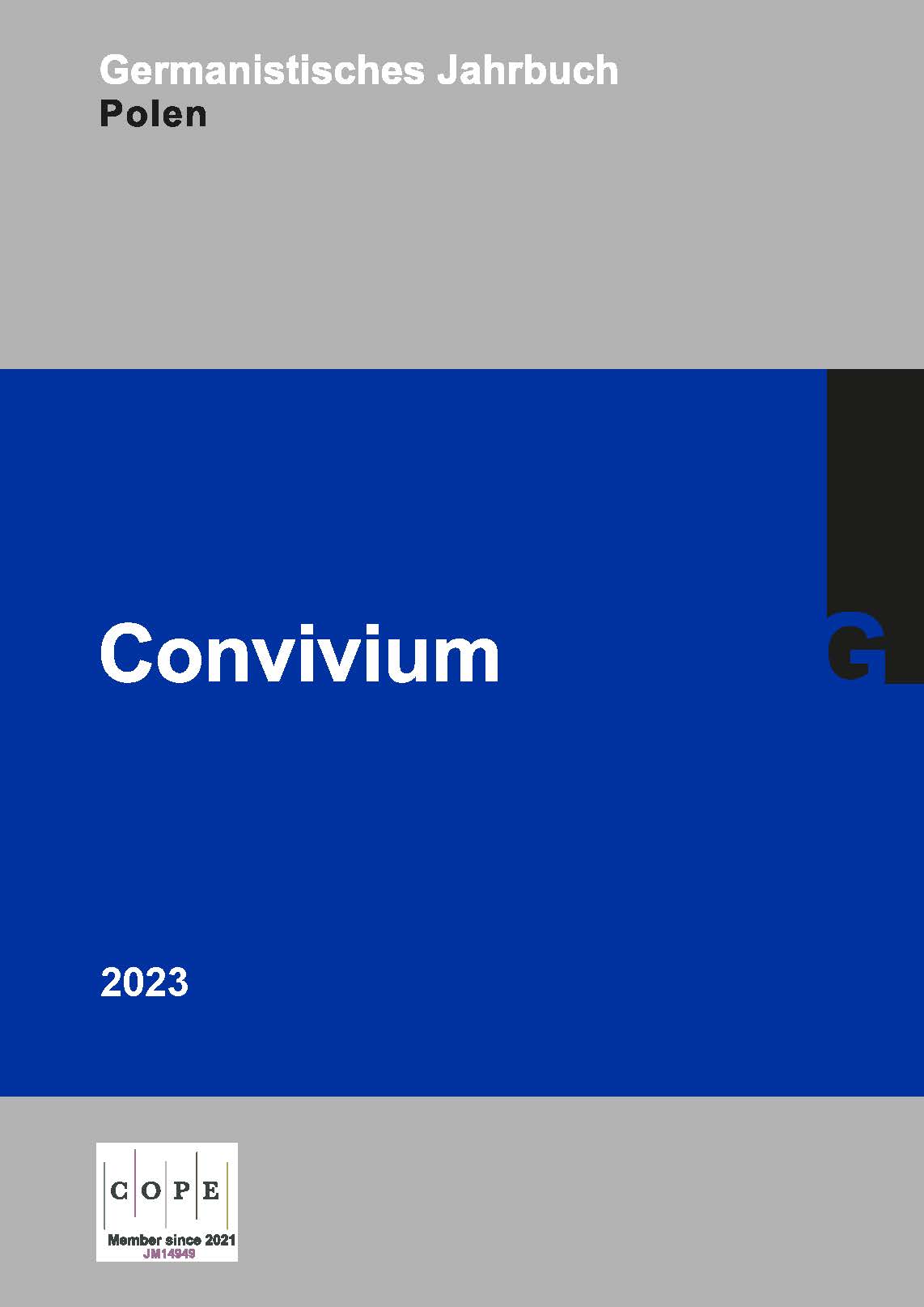Kompetenzportfolio in der Entwicklung der transla-torischen Kompetenz: Formen, Funktionen, Effizienz
DOI:
https://doi.org/10.18778/2196-8403.2023.06Schlagworte:
Kompetenzportfolio, individueller Lernprozess, Design Thinking, KonstruktivismusAbstract
Die Autonomie und die Entwicklung der Translations- und translatorischen Kompetenz werden in dem vorliegenden Beitrag als Phänomene betrachtet, die dank des Kompetenzportfolios gefördert werden. Aus Sicht des konstruktivistischen Ansatzes und des Design Thinking-Konzeptes werden ausgewählte Elemente des Kompetenzportfolios – Kompetenzgrad, Ishikawa Diagramm und Straßenkarte –dargestellt und ihre Effizienz in der Entwicklung der überfachlichen Kompetenzenthematisiert. Hervorgehoben wird ihre Funktion außerhalb der universitären Bildung während der Realisierung von authentischen Translationsaufträgen.
Literaturhinweise
BALLWEG, SANDRA (2015): Portfolioarbeit im Fremdsprachenunterricht. Tübingen.
Google Scholar
BÜHLER, HILDEGUND (1986): Linguistic (Semantic) and Extralinguistic (Pragmatic) Criteria for the Evaluation of Conference Interpretation and Interpreters. In: Multilingua 5(4):231-235.
Google Scholar
GILE, DANIEL (1995): Fidelity Assessment in Consecutive Interpretation. An Experi-ment. In: Target 7(1):151-164.
Google Scholar
DOI: https://doi.org/10.1075/target.7.1.12gil
GILE, DANIEL (2005): Teaching Conference Interpreting. A Contribution. In: Tennent, Martha (eds.): Training for the New Millennium. Amsterdam, 127-151.
Google Scholar
DOI: https://doi.org/10.1075/btl.60.12gil
GILE, DANIEL (2009): Basic concepts and models for interpreter and translator training. Amsterdam.
Google Scholar
DOI: https://doi.org/10.1075/btl.8
GRUCZA, FRANCISZEK (2008): Germanistische Translatorik – ihr Gegenstand und ihre Aufgaben. In: GRUCZA, FRANCISZEK (ed.): Translatorik in Forschung und Lehre der Germanistik. Warszawa, 27-53.
Google Scholar
JUSCHICZ-WAIGL, SARAH (2012): Evaluation von Genesis aus Sicht der konstruktivistischen Didaktik. Wien (Diplomarbeit): https://core.ac.uk/download/pdf/11599901.pdf (01.11.2021).
Google Scholar
KADE, OTTO (1968): Zufall und Gesetzmäßigkeit in der Übersetzung. (Beihefte zur Zeit-schrift Fremdsprachen, I). Leipzig.
Google Scholar
KALINA, SYLVIA (2004): Zum Qualitätsbegriff beim Dolmetschen. In: Lebende Sprachen 49:2-8.
Google Scholar
DOI: https://doi.org/10.1515/LES.2004.2
KERN, JOHANNES (2008): Ishikawa Diagramme. Ursache – Wirkungs-Diagramme als Qualitätswerkzeuge. Norderstedt.
Google Scholar
KLIMKOWSKI, KONRAD / KLIMKOWSKA, KATARZYNA (2021): Design thinking as a tool for participatory and transformative translator education. In: Research Language 19(2):155-167.
Google Scholar
DOI: https://doi.org/10.18778/1731-7533.19.2.04
MAŁGORZEWICZ, ANNA (2010): Auf dem Weg zu einem Modell der Translationsdidak-tik. In: Glottodidactica Vol. XXXVI:21-32.
Google Scholar
DOI: https://doi.org/10.14746/gl.2010.36.02
MAŁGORZEWICZ, ANNA (2015): Die Autonomie des Translators und ihre Bedeutung für die Translationsdidaktik. In: WEIGT, ZENON / KACZMAREK, DOROTA / MAKOWSKI, JACEK / MICHOŃ, MARCIN (eds.): Felder der Sprache. Felder der Forschung. Lodzer Germanistikbeiträge. Text-Wesen in Theorie und Analysen. Łódź, 75-85.
Google Scholar
DOI: https://doi.org/10.18778/7969-808-0.07
MOCER-MERCER, BARBARA (2008): Skill Acquisition in Interpreting: A Human Performance Perspective. In: The Interpreter and Translator Trainer 2(1):1-28.
Google Scholar
DOI: https://doi.org/10.1080/1750399X.2008.10798764
PĘDZISZ, JOANNA (2019): Kształcenie tłumacza symultanicznego a trening rozwoju osobistego. O portfolio tłumaczeniowym jako narzędziu wspierającym samopoznanie. In: Applied Linguistics Papers 26/2:91-102.
Google Scholar
DOI: https://doi.org/10.32612/uw.25449354.2019.2.pp.91-102
REKETAT, HEIKE (2001): Offener Unterricht – eine Förderungsmöglichkeit für hoch begabte Kinder in Regelschulen!? Münster / Hamburg.
Google Scholar
SCHLESINGER, MIRIAM (1997): Quality in Simultaneous Interpreting: Round Table Report. In: GAMBIER, YVES / GILE, DANIEL / TAYLOR, CHRISTOPHER (eds.): Conference Interpreting: Current Trends in Research. Amsterdam / Philadelphia, 123-131.
Google Scholar
STÖGER, JOHANN (2008): Lebensrad. In: RAUEN, CHRISTOPHER (eds.): Coaching-Tools. Erfolgreiche Coaches präsentieren 60 Interventionstechniken aus ihrer Coaching-Praxis. 2. Aufl. Bonn, 153-156.
Google Scholar
SYSKA, ANDREAS (2006): Produktionsmanagement. Das A – Z wichtiger Methoden und Konzepte für die Produktion heute. Wiesbaden.
Google Scholar
WILSS, WOLFRAM (1991): Kognitive Aspekte des Übersetzungsprozesses. In: SCHMITT, CHRISTIAN (ed.): Neue Methoden der Sprachmittlung. Wilhelmsfeld, 121-148.
Google Scholar
WOLFF, DIETER (2002): Fremdsprachenlernen als Konstruktion: Einige Anmerkungen zu einem viel diskutierten neuen Ansatz in der Fremdsprachendidaktik: http://www.babylonia-ti.ch/BABY402/PDF/wolffint.pdf (15.08.2022).
Google Scholar
ŻMUDZKI, JERZY (2008): Zum Stand der Translationsdidaktik in den polnischen Germanistikinstituten. (Ein Arbeitsbericht). In: Glotodidactica Vol. XXXIV:153-171.
Google Scholar
ŻMUDZKI, JERZY (2010): Aktuelle Profile der germanistischen Translationsdidaktik in Polen. In: MAŁGORZEWICZ, ANNA (ed.): Translation: Theorie – Praxis – Didaktik.Dresden / Wrocław, 117-136.
Google Scholar
Downloads
Veröffentlicht
Zitationsvorschlag
Ausgabe
Rubrik
Lizenz

Dieses Werk steht unter der Lizenz Creative Commons Namensnennung - Nicht-kommerziell - Keine Bearbeitungen 4.0 International.










